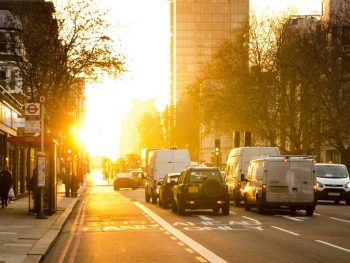A new London-wide campaign has launched today (3 August), encouraging fleets to tackle air pollution caused by idling engines and backed by evidence that air pollution can exacerbate Covid-19 recovery.

Part of the Idling Action Project, jointly led by the City of London Corporation and the London Borough of Camden, the #enginesoff campaign asks firms to pledge that their fleet drivers and other employees will not leave their engines on when parked.
To support its work, the campaign points to emerging evidence that air pollution is linked to poor recovery and higher infection rates of Covid-19 due to damage caused to the lungs.
To help equip fleets with the knowledge of how best to reduce air pollution, Idling Action is offering London drivers free training and a providing a toolkit of resources to businesses, whose operations involve vehicle fleets, professional drivers, or employees who travel by car to work.
Keith Bottomley, Chairman of the City of London Corporation’s Environmental Services Committee, said: “64,000 people die prematurely every year in the UK from breathing polluted air.
“Switching off the engine when your vehicle is parked is more important now than ever before.
“As we learn more about the harmful effects of Covid-19 on the lungs, we are making a particular plea to London’s businesses to play their part in ridding the capital of toxic air and saving lives.”
Firms that have already signed up to the initiative include construction company MACE and Veolia.
Michael Clarke, general manager for Veolia Central London, said: “Preventing engines idling is already high on our agenda and joining the Vehicle Idling Action campaign demonstrates our ongoing commitment to creating a greener and more sustainable city.
“Veolia is investing in zero-emission electric vehicles, as well as trialling alternative fleet solutions, to support the improvement of air quality and avoid pollution.
“We continue to work closely with our teams to ensure that engines are only running when necessary and are switched off when not in use.”

